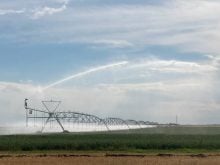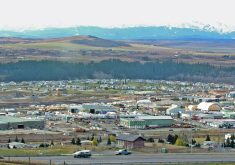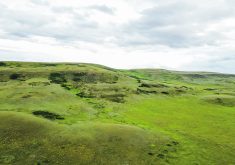Three lease applications covering almost 5,000 acres changed hands between July and August on the Eastern Slopes
(Editor’s note: This story was corrected from an earlier version – 09:15 22/10/2021)
A conservation group fighting to protect public lands in Alberta is sounding an alarm about the transfer of existing coal exploration lease applications in the Eastern Slopes of the Rocky Mountains.
It goes against the spirit of provincial promises about halting such exploration in sensitive Category 2 lands in the region, said Katie Morrison, conservation director for the Canadian Parks and Wilderness Society, Southern Alberta.
Sales of new leases were paused pending the outcome of a public engagement process for a new coal policy for Alberta, she said.
Read Also

Farmers asked to keep an eye out for space junk
Farmers and landowners east of Saskatoon are asked to watch for possible debris in their fields after the re-entry of a satellite in late September.
“While this is at least a transfer, not a new lease, I really think that it is contrary to the intent of those pauses on activity in the Eastern Slopes.”
Three coal lease applications covering almost 5,000 acres changed hands between July and August, said a statement by CPAWS. They were formerly held by the Peace River Coal Corp. and involved three parcels in Category 2 lands in the Livingstone area of the upper Oldman River watershed, said Morrison.
They were transferred to Cabin Ridge Project Ltd., which also holds several adjacent freehold coal agreements, she said.
“They clearly are looking at their current footprint or their current lease holdings and wanting to expand that in the future, and I think that does sort of show their confidence… they think that they will be able to go forward with their mining operations, despite this big pushback from Albertans that don’t want that to happen.”
The transfer has led CPAWS to believe there are activities occurring behind the scenes between coal companies and the provincial government, she said in a statement.
However, Alberta NDP Critic for Environment and Parks Marlin Schmidt said in a statement that “even when the (United Conservative Party) attempted to backpedal on their decision to open up the mountains for coal mining, Minister Savage said the government’s goal was still to develop a coal policy, not a regional plan.
“We have been clear that all exploration activity in that region has been halted.”
However, NDP environment and parks minister Marlin Schmidt said in a statement that “even when the (United Conservative Party) attempted to backpedal on their decision to open up the mountains for coal mining, Minister Savage said the government’s goal was still to develop a coal policy, not a regional plan.
“I’m concerned that this continued approach by the UCP is what is leading these companies on to continue their investments in coal mining exploration. There wouldn’t be continued investment if the UCP had closed the door on mining in the province’s most beautiful landscapes and important watersheds.”
The NDP is pushing the UCP to adopt the Eastern Slopes Protection Act, which is legislation introduced by the NDP that aims to halt all coal mining activities in the Eastern Slopes.
Savage last year rescinded a provincial coal policy dating back to 1976, opening up much of the region to potential open-pit coal mining. Due to widespread opposition to the decision, she reinstated the policy on Feb. 8.
The Coal Policy Committee was formed in March to gather public input for a new policy. A report is expected in mid-October.
Morrison said the stakes are high for producers because the Eastern Slopes contains the headwaters for rivers relied on by much of Western Canada. Besides the impact on ranchers in the immediate area, she feared contamination due to open-pit coal mining could affect people for hundreds of kilometres downstream.
Thirty-five scientists at the University of Alberta sent a letter to provincial MLAs stating April 16 that young animals, including humans, are acutely sensitive to toxins dissolved in water.
“There is no reliable method to stop leaching of hazardous waste produced by surface coal mining into groundwater where, inevitably, it will pollute precious watersheds we all depend on that are already under severe stress.”


















